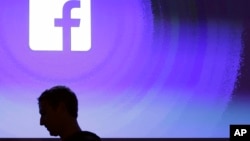Facebook has announced the launch of its own digital currency in a major new push into the worldwide financial services industry.
The new currency will be a cryptocurrency similar to bitcoin. A cryptocurrency is a kind of money that does not exist in the form of bills or coins. Governments and banks do not oversee the money. Instead, it is exchanged digitally between buyers and sellers using secret codes for security.
A network of computers records cryptocurrency activity between users. The activity is included in a “ledger,” or list, known as the blockchain. The blockchain permits the activity records to be checked and stored securely. People keep their cryptocurrency in digital wallets that operate in a way similar to online banks.
Facebook is calling its cryptocurrency Libra. It expects to launch the service publicly in the first half of next year.
The U.S.-based social media service says Libra will be available to anyone with a smartphone and internet connection. “Moving money around the world should be as easy and cheap as sending a text message,” Facebook says on its website. “No matter where you live, what you do, or how much you earn.”
The company says it especially wants to reach an estimated 1.7 billion “unbanked” people across the world who currently do not use a bank. Costs to use Libra will be lower than what other companies currently charge for the service, Facebook said. It has not yet released pricing information, however.
Facebook says its digital currency will differ in several ways from bitcoin and other popular cryptocurrencies in use today. Unlike the others, the company says, Libra’s value will be tied to real money backed by banks and government securities in major currencies like the U.S. dollar, euro, yen and others.
The Libra system will also be supported by several traditional financial companies, including PayPal, Visa, Mastercard and eBay. Facebook set up the Switzerland-based not-for-profit Libra Association to govern the activities of the digital currency.
The company says these changes are aimed at improving trust and preventing major valuation changes of the Libra. Investors in bitcoin and other cryptocurrencies have lost hundreds of millions of dollars because of sharp price drops and computer attacks.
Facebook created a separate company, called Calibra, to operate the Calibra wallet system. The wallet is used to store, send and receive Libras. Calibra will be available as an app on smartphones or directly from Facebook’s Messenger and WhatsApp products.
Facebook said it had taken major steps to create a system that is private and secure. People using Calibra will first have to go through a process to confirm their identities.
The company says Calibra will only share user information with parent company Facebook and third parties when it receives user permission to do so. User information might also be shared in some other “limited cases,” such as when law enforcement requests information, Facebook said in a statement.
Facebook has promised not to use any Calibra data to improve targeting of its advertising. Businesses will see the same information about users who pay with Libra as they do about users paying with credit cards, the company said.
Even with such statements and promises, Facebook is likely to face serious questions about its new cryptocurrency system from lawmakers in the United States and other countries. Some American lawmakers have already proposed that Facebook face new rules or penalties – or possibly even be forcibly broken up - for major incidents involving the misuse of private user data.
I’m Bryan Lynn.
Bryan Lynn wrote this story for VOA Learning English, based on reports from the Associated Press, Reuters, Agence France-Presse and Facebook. Ashley Thompson was the editor.
We want to hear from you. Write to us in the Comments section, and visit our Facebook page.
______________________________________________________________
Words in This Story
digital – adj. related to computer technology, especially the internet
wallet – n. container used to hold money
cheap – adj. low cost
app – n. program for a smartphone or other device that performs a special function
penalty – n. a punishment for doing something that is against a law or rule









